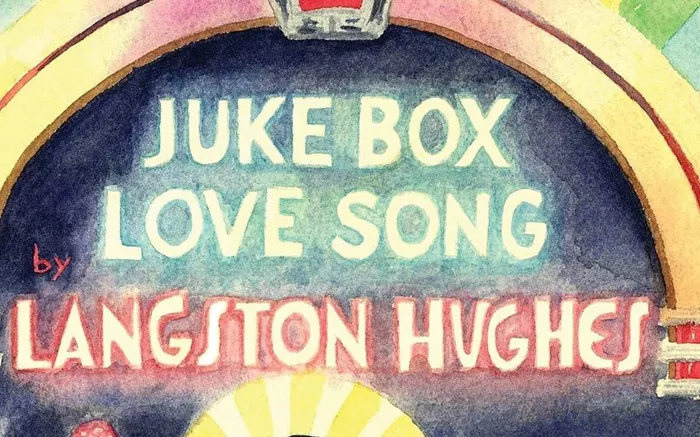Welcome to Poem of the Day – Juke Box Love Song by Langston Hughes
Langston Hughes, a prominent figure of the Harlem Renaissance, is renowned for his ability to capture the pulse of African American culture and life. In his poem “Juke Box Love Song,” Hughes explores themes of love, music, and desire, all set within the context of the lively, vibrant atmosphere of a juke joint—a popular gathering place in African American communities.
Juke Box Love Song Poem
I could take the Harlem night
and wrap around you,
Take the neon lights and make a crown,
Take the Lenox Avenue busses,
Taxis, subways,
And for your love song tone their rumble down.
Take Harlem’s heartbeat,
Make a drumbeat,
Put it on a record, let it whirl,
And while we listen to it play,
Dance with you till day—
Dance with you, my sweet brown Harlem girl.
Juke Box Love Song Explanation
“Juke Box Love Song” is a short, rhythmic poem that paints a vivid picture of a romantic moment. The speaker expresses deep affection for someone, using music as a metaphor for love. The poem is filled with the energy and rhythm characteristic of the blues, a genre of music closely tied to African American experience. Through the imagery of the juke box, Hughes weaves together the notions of love, longing, and the powerful connection between music and emotion.
Structure and Form
The poem consists of four short stanzas with a simple, repetitive structure. This mirrors the repetitive, rhythmic nature of the juke box, which plays songs in a loop. The repetition of certain phrases in the poem helps emphasize the speaker’s emotions, reinforcing the intensity and continuity of love. This structure also mimics the pattern of everyday life, where familiar rhythms and routines bring comfort.
Explanation of Key Themes
1. Love as a Universal Experience
In “Juke Box Love Song,” the speaker’s emotions are relatable to anyone who has experienced the intensity of love. Hughes uses straightforward language to communicate the deep longing and affection felt by the speaker, making it accessible to a wide audience. The use of the juke box as a symbol of love indicates how music can express feelings that words alone may fail to capture.
2. The Connection Between Music and Emotion
The juke box, often associated with popular music in the 1940s, symbolizes the role of music in the lives of ordinary people. In the poem, music is not just entertainment—it is a vessel for emotional expression. The speaker seems to suggest that love, like music, has the power to touch the soul and elevate the ordinary to the extraordinary.
3. Desire and Passion
The poem conveys a sense of longing and desire. The speaker’s words are charged with emotion, reflecting a deep yearning for the person they love. The juke box, constantly playing music, becomes a metaphor for the speaker’s constant, unyielding feelings. The music, much like the speaker’s emotions, is always in motion, never stagnant.
4. The Setting of the Juke Joint
The juke joint is a key setting in the poem. These informal spaces were central to the cultural life of African Americans in the early 20th century. By choosing this setting, Hughes connects the speaker’s personal experience of love to the larger cultural experience of African American communities. The juke box itself serves as a focal point, symbolizing both the individual experience of love and the collective experience of community.
Language and Imagery
Hughes’s choice of language is simple, yet it is layered with meaning. The words are clear and direct, but they resonate with deep emotion. The imagery of the juke box, with its “singing” tunes and rhythmic beats, evokes a sense of motion and music that mirrors the speaker’s feelings. The sound of the music in the poem is almost palpable, bringing to life the emotional intensity of the speaker’s love.
Conclusion
In “Juke Box Love Song,” Langston Hughes presents love as a powerful, all-encompassing force, framed by the cultural backdrop of African American music and life. Through his use of the juke box, Hughes explores the intersection of music, love, and emotion, drawing readers into a world where feelings are as fluid and dynamic as the melodies that play on the juke box. The poem’s simplicity, rhythmic structure, and emotional depth make it a timeless expression of love and the human experience.
Hughes masterfully demonstrates that love, much like music, is universal and capable of transcending boundaries, offering both a personal and cultural reflection on the power of connection.

